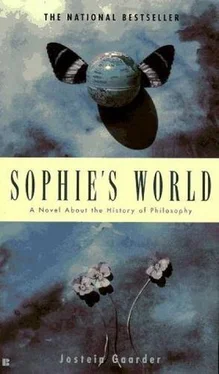Jostein Gaarder - Sophie's World - A Novel About the History of Philosophy
Здесь есть возможность читать онлайн «Jostein Gaarder - Sophie's World - A Novel About the History of Philosophy» весь текст электронной книги совершенно бесплатно (целиком полную версию без сокращений). В некоторых случаях можно слушать аудио, скачать через торрент в формате fb2 и присутствует краткое содержание. ISBN: , Издательство: BERKLEY BOOKS, NEW YORK, Жанр: Философия, на английском языке. Описание произведения, (предисловие) а так же отзывы посетителей доступны на портале библиотеки ЛибКат.
- Название:Sophie's World: A Novel About the History of Philosophy
- Автор:
- Издательство:BERKLEY BOOKS, NEW YORK
- Жанр:
- Год:неизвестен
- ISBN:0-425-15225-1
- Рейтинг книги:4 / 5. Голосов: 1
-
Избранное:Добавить в избранное
- Отзывы:
-
Ваша оценка:
- 80
- 1
- 2
- 3
- 4
- 5
Sophie's World: A Novel About the History of Philosophy: краткое содержание, описание и аннотация
Предлагаем к чтению аннотацию, описание, краткое содержание или предисловие (зависит от того, что написал сам автор книги «Sophie's World: A Novel About the History of Philosophy»). Если вы не нашли необходимую информацию о книге — напишите в комментариях, мы постараемся отыскать её.
Sophie's World: A Novel About the History of Philosophy — читать онлайн бесплатно полную книгу (весь текст) целиком
Ниже представлен текст книги, разбитый по страницам. Система сохранения места последней прочитанной страницы, позволяет с удобством читать онлайн бесплатно книгу «Sophie's World: A Novel About the History of Philosophy», без необходимости каждый раз заново искать на чём Вы остановились. Поставьте закладку, и сможете в любой момент перейти на страницу, на которой закончили чтение.
Интервал:
Закладка:
“It’ll probably turn out that this extraordinary person has written a whole book about you, Sophie. It’s called using a pseudonym.”
“It’s not him, Mom. Why don’t you just give up. You don’t understand anything anyway.”
“No, I don’t suppose I do. The garden party is tomorrow, then everything will be all right again.”
“Albert Knag lives in a completely different reality. That’s why this book is a white crow.”
“You really must stop all this! Wasn’t it a white rabbit?”
“You stop it!”
That was as far as they got before they reached their stop at the end of Clover Close. They ran straight into a demonstration.
“My God!” exclaimed Helene Amundsen, “I really thought we would be spared street politics in this neighborhood.”
There were no more than about ten or twelve people. Their banners read:
THE MAJOR IS AT HAND
YES TO YUMMY MIDSUMMER EATS
MORE POWER TO THE UN
Sophie almost felt sorry for her mother.
“Never mind,” she said.
“But it was a peculiar demonstration, Sophie. Quite absurd, really.”
“It was a mere bagatelle.”
“The world changes more and more rapidly all the time. Actually, I’m not in the least surprised.”
“You should be surprised that you’re not surprised, at any rate.”
“Not at all. They weren’t violent, were they? I just hope they haven’t trampled all over our rosebeds. Surely it can’t be necessary to demonstrate in a garden. Let’s hurry home and see.”
“It was a philosophical demonstration, Mom. Real philosophers don’t trample on rosebeds.”
“I’ll tell you what, Sophie. I don’t think I believe in real philosophers any longer. Everything is synthetic nowadays.”
They spent the afternoon and evening preparing. They continued the next morning, setting and decorating the table. Joanna came over to give them a hand.
“Good grief!” she said, “Mom and Dad are coming too. It’s your fault, Sophie!”
Everything was ready half an hour before the guests were due. The trees were festooned with streamers and Japanese lanterns. The garden gate, the trees lining the path, and the front of the house were hung with balloons. Sophie and Joanna had spent most of the afternoon blowing them up.
The table was set with chicken, salad, and different kinds of homemade bread. In the kitchen there were raisin buns and layer cake, Danish pastry and chocolate cake. But from the start the place of honor in the center of the table was reserved for the birthday cake—a pyramid of almond-paste rings. On the top of the cake was the tiny figure of a girl in a confirmation dress. Sophie’s mother had assured her that it could just as well represent an unconfirmed fifteen-year-old, but Sophie was certain her mother had only put it there because Sophie had told her she was not sure she wanted to be confirmed. Her mother seemed to think the cake embodied the confirmation itself.
“We haven’t spared any expense,” she repeated several times in the half hour before the party was due to start.
The guests began to arrive. First came three of the girls from Sophie’s class, dressed in summer shirts and light cardigans, long skirts, and the barest suggestion of eye makeup. A bit later, Jeremy and David came strolling in through the gate, with a blend of shyness and boyish arrogance.
“Happy birthday!”
“You’re an adult now, too!”
Sophie noticed that Joanna and Jeremy had already begun eyeing each other discreetly. There was something in the air. It was Midsummer Eve.
Everybody had brought birthday presents, and as it was a philosophical garden party, several of the guests had tried to find out what philosophy was. Although not all of them had managed to find philosophical presents, most of them had written something philosophical on their cards. Sophie received a philosophical dictionary as well as a diary with a lock; on the cover was written MY PERSONAL PHILOSOPHICAL THOUGHTS. As the guests arrived they were served apple juice in long-stemmed wine glasses. Sophie’s mother did the serving.
“Welcome ... And what is this young man’s name? I don’t believe we’ve met before ... So glad you could come, Cecilie . . .”
When all the younger guests had arrived and were strolling under the trees with their wine glasses, Joanna’s parents drew up at the garden gate in a white Mercedes. The financial adviser was impeccably dressed in an expensively cut gray suit. His wife was wearing a red pants suit with dark red sequins. Sophie was sure she had bought a Barbie doll in a toy store dressed in that suit, and had a tailor make it up in her size. There was another possibility; the financial adviser could have bought the doll and given it to a magician to make into a live woman. But this possibility was unlikely, so Sophie rejected it.
They stepped out of the Mercedes and walked into the garden where younger guests looked at them with surprise. The financial adviser presented a long, narrow package from the Ingebrigtsen family. Sophie tried hard to maintain her composure when it turned out to be—yes, it was!—a Barbie doll. But Joanna made no such effort:
“Are you crazy? Sophie doesn’t play with dolls!”
Mrs. Ingebrigtsen came hurrying over, with all her sequins clanking. “But it’s only for decoration, you know.”
“Well, thank you very much indeed.” Sophie tried to smooth things over. “Now I can start ft collection.”
People began to drift toward the table.
“We’re only waiting for Alberto,” said Sophie’s mother to her in a somewhat brisk tone that was intended to hide her growing apprehension. Rumors of the special guest of honor had already spread among the other guests.
“He has promised to come, so he’ll come.”
“But we can’t seat the guests before he arrives, can we?”
“Of course we can. Let’s go ahead.”
Helene Amundsen began to seat people around the long table. She made sure that the vacant chair was between her own and Sophie’s place. She said a few words about the beautiful weather and the fact that Sophie was now a grownup.
They had been sitting at the table for half an hour when a middle-aged man with a black goatee and a beret came walking up Clover Close and in through the garden gate. He was carrying a bouquet of fifteen red roses.
“Alberto!”
Sophie left the table and ran to greet him. She threw her arms around his neck and took the bouquet from him. He responded to the welcome by rooting around in his jacket pocket and drawing out a couple of Chinese firecrackers which he lit and tossed into the yard. As. he approached the table, he lit a sparkler and set it on top of the almond pyramid. Then he went over and stood at the empty place between Sophie and her mother.
“I’m delighted to be here,” he said.
The guests were dumbstruck. Mrs. Ingebrigtsen gave her husband a significant look. Sophie’s mother was so relieved that the man had finally arrived, however, that she would have forgiven him anything. Sophie herself was struggling to suppress her laughter.
Helene Amundsen tapped on her glass and said:
“Let us also welcome Alberto Knox to this philosophical garden party. He is not my new boyfriend, because although my husband is so often away at sea, I don’t have a new boyfriend for the time being. However, this astounding person is Sophie’s new philosophy teacher. His prowess extends further than to setting off fireworks.
This man is able, for example, to draw a live rabbit out of a top hat. Or was it a crow, Sophie?”
“Many thanks,” said Alberto. He sat down.
“Cheers!” said Sophie, and the guests raised their glasses and drank his health.
They sat for a long time over their chicken and salad. Suddenly Joanna got up, walked determinedly over to Jeremy, and gave him a resounding kiss on the lips. He responded by trying to topple her backward over the table so as to get a better grip as he returned her kiss.
Читать дальшеИнтервал:
Закладка:
Похожие книги на «Sophie's World: A Novel About the History of Philosophy»
Представляем Вашему вниманию похожие книги на «Sophie's World: A Novel About the History of Philosophy» списком для выбора. Мы отобрали схожую по названию и смыслу литературу в надежде предоставить читателям больше вариантов отыскать новые, интересные, ещё непрочитанные произведения.
Обсуждение, отзывы о книге «Sophie's World: A Novel About the History of Philosophy» и просто собственные мнения читателей. Оставьте ваши комментарии, напишите, что Вы думаете о произведении, его смысле или главных героях. Укажите что конкретно понравилось, а что нет, и почему Вы так считаете.












